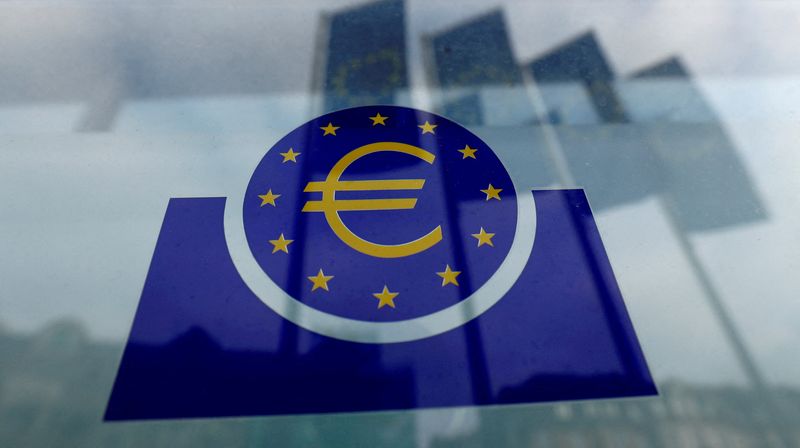By Shrutee Sarkar
BENGALURU (Reuters) - The European Central Bank will raise its deposit rate in the second half of this year, and not wait until 2023 as previously expected, according to a Reuters poll of economists who also sharply upgraded their inflation forecasts for this year.
The change in view followed a shift in the ECB Governing Council to concerns about consumer price inflation, rising rapidly across much of the world and which hit a record high of 5.1% in the 19-member euro zone in January on a year earlier.
While a majority of ECB watchers polled between Feb. 7 and 14 expected the central bank to lift the deposit rate to -0.25% by end-year from a record low of -0.50%, financial markets are already pricing in a return to zero by that time.
Even that would leave the ECB well behind the U.S. Federal Reserve, expected to raise its federal funds rate from a range of 0%-0.25% in March, possibly by half a point, with some banks expecting as many as seven Fed rate rises by the end of 2022.
Poll respondents were split on when the first ECB rate rise would take place, with one economist expecting a move in the second quarter, 16 of 51 forecasting a hike in Q3, and another 21 expecting it to come in Q4.
A quarter of respondents, 13 of 51, still see no deposit rate rise this year, and only about 20%, or 11 of 51, expect it to reach zero at any point in 2022.
"Given the underlying inflation outlook and the risks the ECB is juggling, tightening is likely to be gradual and moderate, and the size of recent market moves still look overdone to us," wrote Simon Wells, chief European economist at HSBC, in a note to clients.
Graphic: Reuters poll graphic on euro zone inflation and interest rates- https://fingfx.thomsonreuters.com/gfx/polling/jnpwelowbpw/Reuters%20poll%20graphic%20on%20euro%20zone%20inflation%20and%20interest%20rates.PNG
The ECB is meanwhile widely expected to end its Pandemic Emergency Purchase Programme in March. More than two-thirds of respondents, or 31 of 45, also said the parallel Asset Purchase Programme, launched before the pandemic, will be shuttered by September.
Disruptions related to the Omicron variant wave of COVID-19 infections slowed euro zone economic growth to 0.3% last quarter. It was barely expected to pick up from there this quarter to 0.4%.
Growth was then expected to accelerate to a peak of 1.2% in Q2 before slowing to 1.0% and 0.7% in Q3 and Q4, respectively. In the January poll, those numbers were 0.5%, 1.1%, 0.9%, and 0.6%.
The economy was forecast to grow 3.9% on average this year, versus 4.0% in last month's poll. It was then forecast to clock 2.5% next year, slightly up from the 2.4% predicted in January.
Euro zone inflation was forecast to average 3.8% this year and fall below the ECB's 2% target to 1.8% in 2023 versus 3.0% and 1.7% predicted in January.
On a quarterly basis, inflation was predicted to average 5.1% and 4.7% this quarter and next. It was then forecast at 3.9% and 2.7% for Q3 and Q4, respectively.
A like-for-like analysis showed more than 80% of nearly 20 economists had revised those inflation forecasts up by at least one-fifth on average.
Over 80% of respondents, or 34 of 42, said inflation would peak this quarter.

"We expect inflation to fall again quite sharply over the next few quarters, and so it will be very unlikely the ECB will hike rates every quarter next year," said Martin Weder, senior economist at ZKB, the most accurate forecaster for the euro zone economy in Reuters polls for 2021 according to Refinitiv Starmine.
(For other stories from the Reuters global economic poll:)